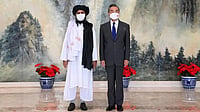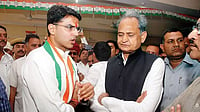On a dull Wednesday afternoon, Dr. K, after finishing the routine chores, sits in his office situated on the periphery of the mortuary compound. Inside the office, one can hear the faint sirens of ambulances intermittently coming and going.
“You see, we are the eyes of the court,” Dr. K says. “Hamarey bagair kaanoon sach mai andha hota (Without us, law would have really been blind).”
Forensic pathologists play a crucial role in criminal investigations. Dr. K, wishing not to be named, works as a medical examiner —a physician charged with investigating deaths— at one of the busiest mortuaries in New Delhi. Medical examiners like him offer answers to families of people who die unexpectedly and, in some cases, without an obvious explanation, through autopsies, which are as much crucial for law enforcement agencies to solve crimes like homicides.
Through autopsy, a physician can establish not only the cause, manner, time and pattern of the injuries, but also whether the injuries occurred before or after death.
“For solving the murder cases, the biggest evidence is the body of the victim itself,” quips Dr. K while recalling an incident when a mysterious drowning case had come to him. “Everyone, including the police, thought it was a case of drowning. But when we conducted autopsies, we realised that the victims were subjected to severe head trauma, died of severe injuries, and their bodies were dumped in a canal,” he adds.
The police later registered an FIR invoking not only Section 302 of the Indian Penal Code (IPC) for murder but also Section 201, which deals with destruction of evidence, because the murderers had tried to destroy evidence by dumping the bodies into the canal. Here, the autopsy changed the entire course of the probe.
According to the National Crime Records Bureau (NCRB), on average 82 persons are murdered every day in India. However, the conviction rate in cases registered under the IPC was 57 per cent in 2021, a 2.2 per cent decrease from the previous year. Trial was completed only in 11,86,377 cases, whereas a whopping 1,44,44,079 cases remain pending, which is 91.2 per cent of the total cases registered.
With an abysmally low conviction rate in cases of heinous crimes like murders, the NCRB data suggests that in almost half the murder cases, wrong people were arrested. Even if the right ones were held for the crime, there was lack of evidence that could prove the accused guilty of the crime beyond any doubt. In innumerable cases, there was either no justice for the victims or the accused detained and tried were innocent.
But such dismal performance can change significantly for better if a Medical Examiner System is put in place for dealing with homicide cases. It is very common that the first party that arrives at the scene is police once a crime is reported. Ideally, says Dr. K, police should be accompanied by forensic pathologists and experts from forensic science laboratories (FSLs) to ensure that all possible evidence from crime scene is collected and transparency in probe is maintained.
Once a police party arrives, a lot of crucial evidence is unintentionally tampered with because, as K says, policemen are not experts in forensics or medicine. “Often vital things are lost,” he says. “Imagine a policeman touching things at the scene unintentionally and wiping out vital fingerprints?” What if while retrieving a dead body, a policeman unintentionally bruises or tampers with the body?” asks Dr. K.
The concerns he raises are genuine. In India, the inquest system is often conspicuous by its absence at the scene of crime. In a study title Death Investigation Systems: India, R.G. Menezes, M. Arun, and K. Krishna write, “The concept of death investigation requires a multifaceted approach, involving a multidisciplinary team, in order that the whole exercise assists the judiciary to achieve justice.”
The authors conclude, “India needs a better type of inquest system where specially trained and skilled forensic medical experts play a key role in not only conducting the medico-legal autopsy but also in examination of the death scene routinely.”
Sections 174 and 176 of the Criminal Procedure Code (CrPC) only permit the holding of police and magistrate inquests in India, and both of these officials are scientifically “lay people” who have had no formal training in forensic science and law. In India, if one agency is in charge of the autopsy and other scientific investigations, a different agency is in charge of the crime scene investigation. There is very little cooperation among these organisations, which all operate independently.
For instance, the Delhi Police comes under the jurisdiction of Union Home Ministry, the FSLs fall under Delhi Home Ministry and forensic pathologists fall under the domain of the Union Health Ministry. It is apparent that owing to different jurisdictions, it is difficult for all the three agencies to coordinate properly during an inquest as their teams report to different sets of officials.
The medical examiner system of inquests, where medical experts work hand-in-hand with other investigative officials, is used in the countries like United States, Canada, and Japan. Since the investigations under such system have the least margins of error, this inquest system is widely regarded as the best in the world.
However, Dr. K is not very optimistic about the changes happening in very near future. He sarcastically says, “Sahab, agar hamko power diya jayega, toh police ki monopoly khatam ho jayegi (If medical examiners are given a say, police will lose its monopoly of investigating homicides).”
Underlying in what Dr. K says is a subtle suggestion that the transparency inquest reforms would bring to justice system would go against those police officials who make a fortune on the sly in such cases.


























